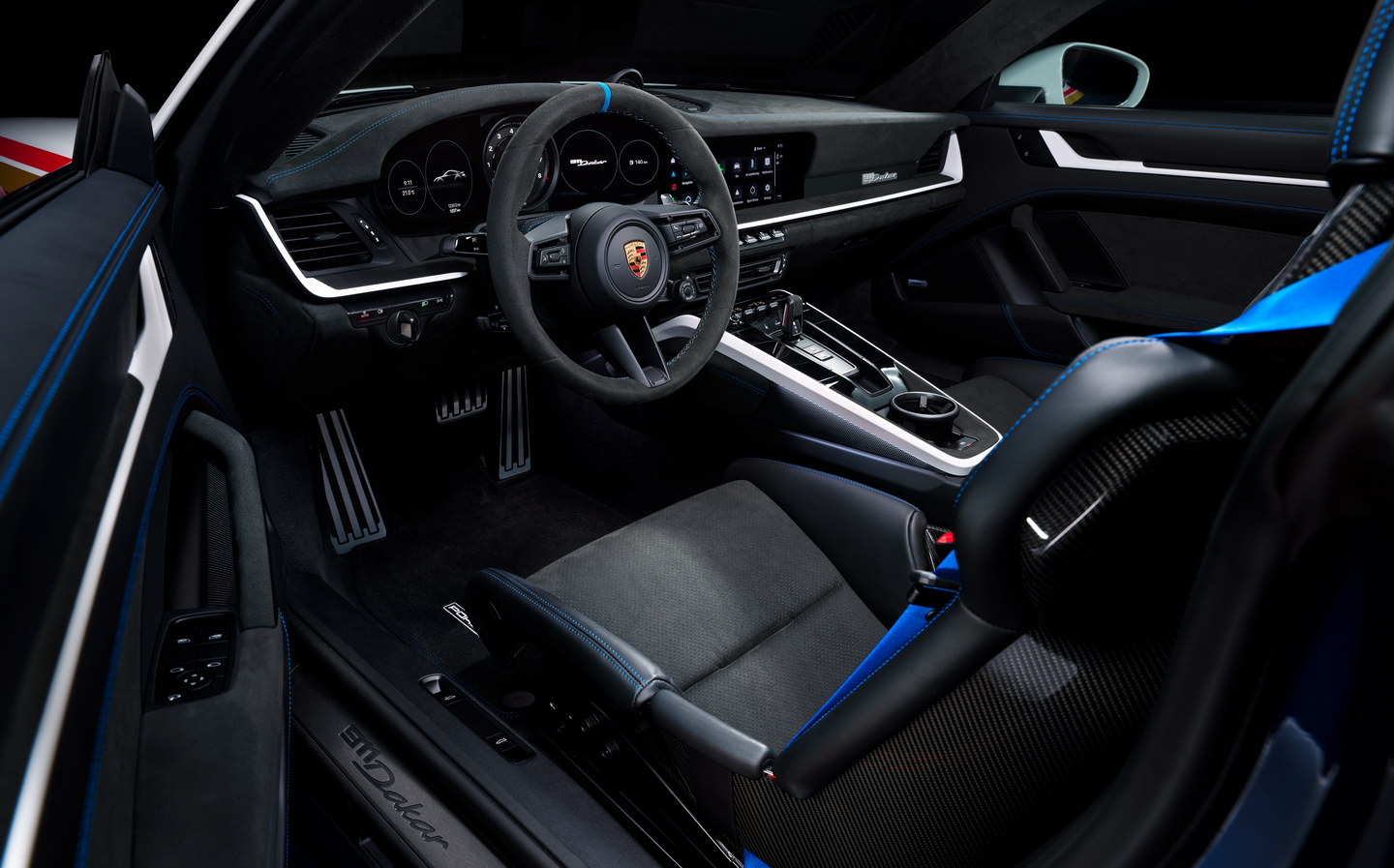Porsche unveils rally-inspired all-terrain 911 Dakar with suspension lift and racing livery option
Is it silly? Yes. Do we badly want one? Also yes
Porsche has unveiled the 911 Dakar, a new off-road variant of its rear-engined sports car inspired by its rally-winning machinery of old.
Featuring a suspension lift, driving modes optimised for all-terrain performance and a roof rack built to accommodate fuel canisters, traction mats and the like to give it rugged go-anywhere abilities way beyond its sports car roots.
The 911 Dakar’s name is derived from Porsche’s entry in the gruelling Paris-Dakar rally of 1984, in which it took outright victory using a heavily-modified 911 (internally dubbed the 953) equipped with four-wheel drive.
Many customers, we suspect, will opt for the evocative Rally Design colour scheme, which pays tribute to the 953 that claimed the victory for Porsche and was painted with an unforgettable Rothmans cigarette livery.
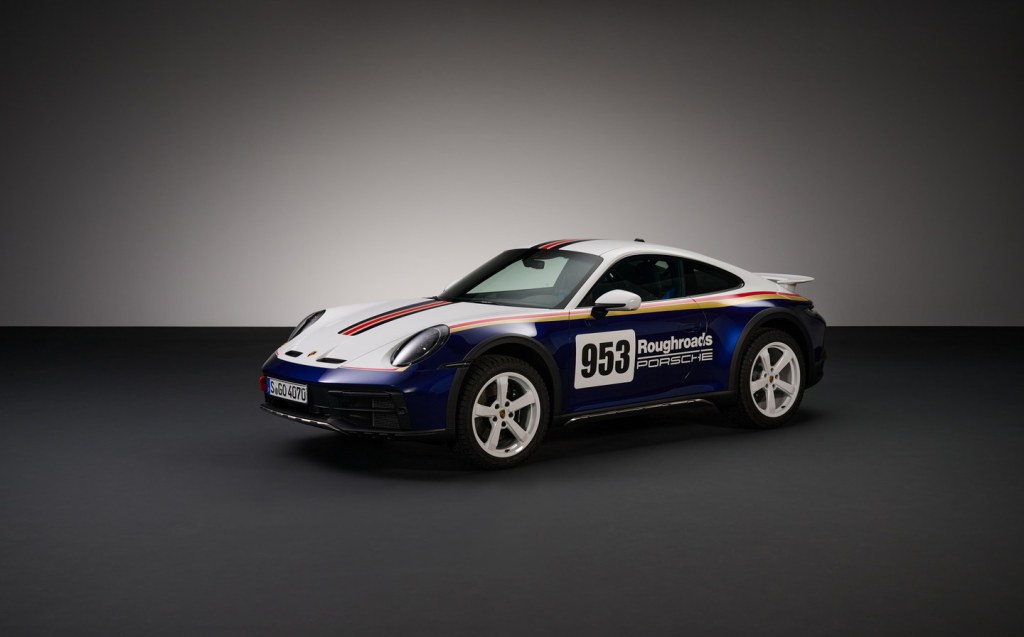
The Dakar is obviously taller than its 911 Carrera siblings and that’s mostly down to its 50mm (just under two-inch) suspension height increase.
But further increasing the gap from the floor to the ground is a set of specially-developed chunky Pirelli Scorpion All Terrain Plus tyres (245/45 R19 up front and 295/40 R20 at the rear), featuring a 9mm-deep tread pattern and reinforced sidewalls.
Differentiating the Dakar further from its road-focused brethren are the carbon-fibre reinforced plastic (CFRP) bonnet and fixed rear spoiler taken from the 911 GT3, while aluminium towing eyes, widened wheel wells and sills, and stainless steel plates funder the body all underscore the Dakar’s all-terrain nous.
Even the rear air intakes feature a stainless-steel grille to prevent the ingress of flying stones.
Up top, there’s an optional roof rack replete with a 12-volt socket for powering its forward-facing spotlights.

That roof rack can accommodate up to 42kg and there’s even the option of a roof tent for those particularly keen on exploiting the Dakar’s adventurous potential.
Once inside, it’s quite a lot more stripped-down than a standard 911, with full bucket seats up front and no rear seats.
That weight reduction inside, coupled with the CFRP panels, lightweight glass and lightweight battery, means that the Dakar only weighs in at 1,605kg — just 10kg heavier than a Carrera 4 GTS equipped with a PDK gearbox.
One of the big clues as to the Dakar’s abilities compared to other 911s lies on the steering wheel where sits a rotary control giving the driver the option to choose “Rally” and “Offroad” driving modes.
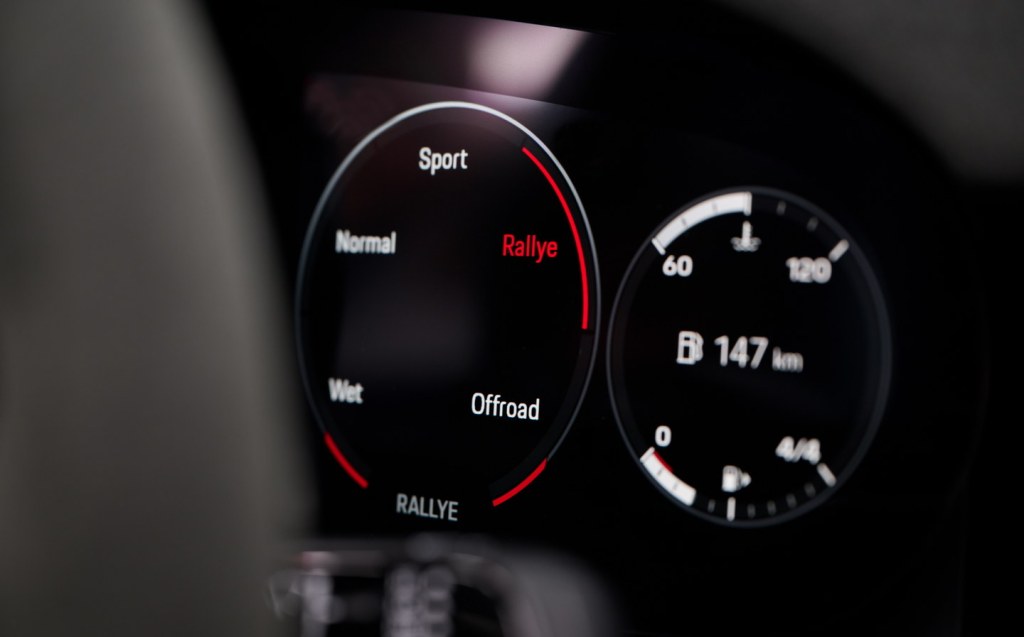
Rallye is geared towards loose and uneven surfaces and biases the all-wheel-drive system towards the rear.
Offroad is for when the driver needs more in the way of ground clearance, and it raises the suspension by another 30mm “for off-road adventures at speeds of up to 106mph”. Beyond that speed, the suspension reverts to its standard height.
Both modes feature Rally Launch Control, which is intended for use on loose surfaces and allows wheel slippage of no more than 20%.
Powering the Dakar is, as expected, the 3-litre version of Porsche’s twin-turbo flat-six cylinder engine developing, in this instance, 473bhp and 419lb ft of torque, which is sent to all four wheels through an eight-speed double-clutch PDK gearbox.
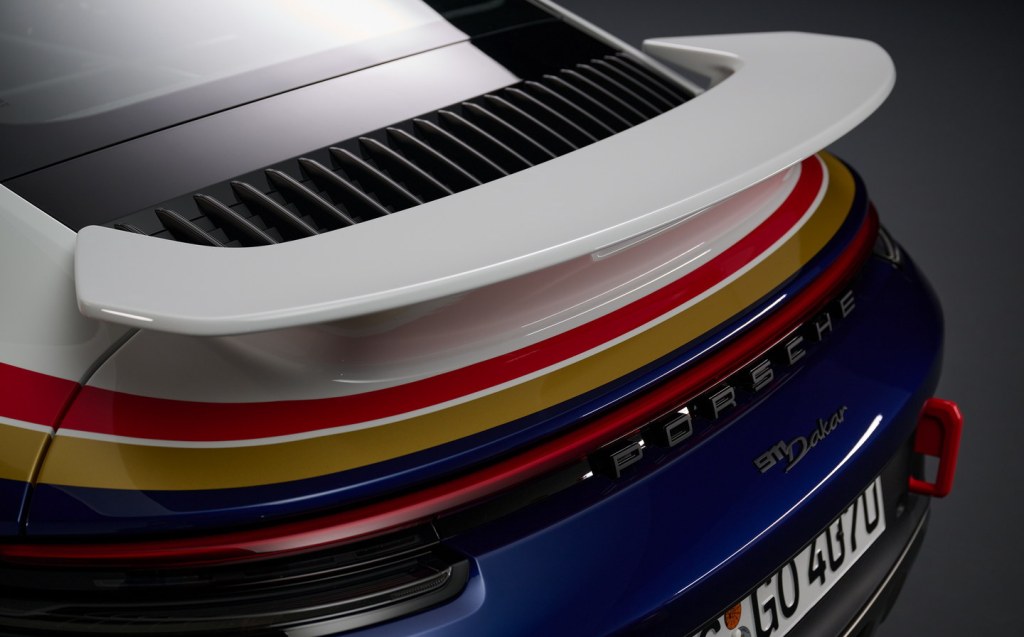
That’s enough to give the Dakar an impressive 0-62mph sprint time of 3.9 seconds, though the top speed suffers somewhat compared to other 911s, maxing-out at 149mph, due to the compromised aerodynamics.
Helping the Dakar keep its composure are rear-axle steering, the same dynamic engine mounts seen on the 911 GT3 and Porsche Dynamic Chassis Control anti-roll stabilisation.
Porsche’s intention with the Dakar, it said, was to create a vehicle “just as capable on sand and gravel as it is on the Nordschleife,” referring to the famous Nürburgring Nordschleife racing circuit in Germany that is used as a benchmark for performance cars.
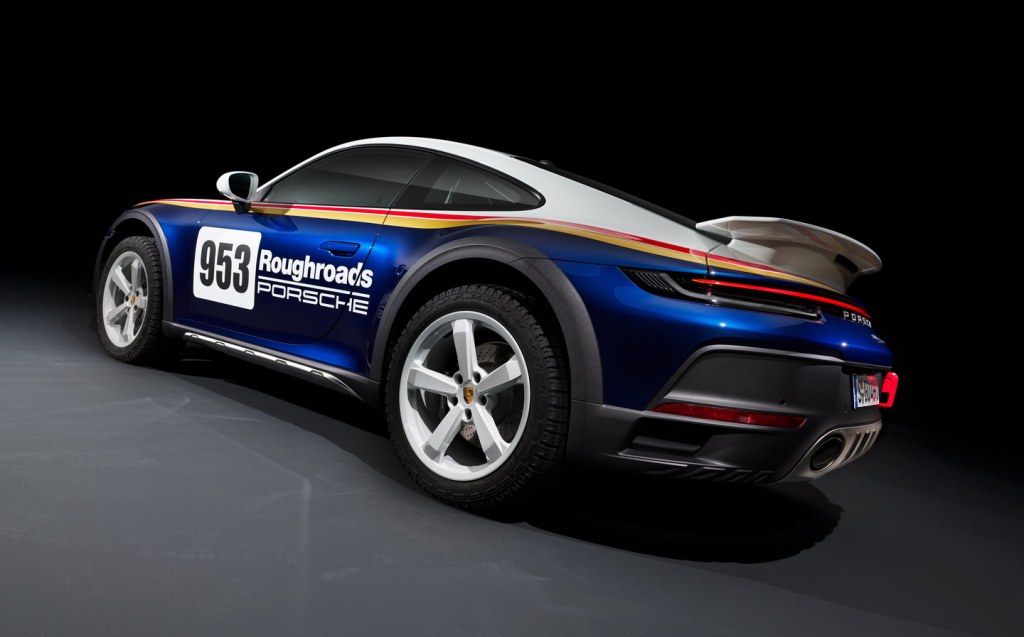
One of the more expensive optional extras on the Dakar is the £18,434 Rally Design Package that, other than an all-white finish, allows owners to specify their cars in a white and blue two-tone colour scheme with starting numbers on the door ranging from one to 999.
For those keen to recreate the look of the Paris-Dakar 953, there’s the ability to add red and gold stripes to the two-tone paint job and a “Roughroads” decal in place of the old Rothmans logo — Porsche presumably no longer wishes, in this day and age, to be associated with a tobacco company.
Lamborghini has the same off-road ambitions
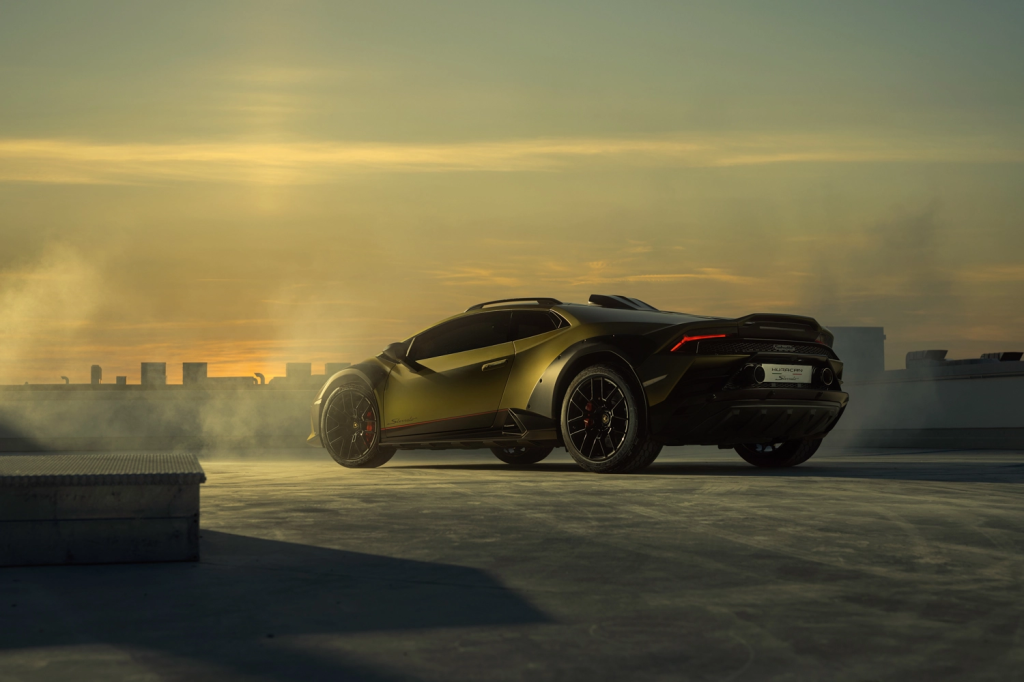
The reveal of the Porsche 911 Dakar at the Los Angeles Auto Show comes just two weeks ahead of the unveiling of a similar style of car from another arm of the wider Volkswagen Group — the Lamborghini Huracán Sterrato.
The Sterrato follows a similar line of thinking to the 911 Dakar in that it takes a standard sports car and raises the ride height (by the same 50mm or so) to give it slightly more off-road capability.
Lamborghini has, in a series of teaser videos, given a fairly clear idea of just how the Sterrato (which means “dirt road” in Italian) looks with chunky tyres, plastic cladding, roof rack and rally-style front spotlights, but hasn’t said anything as yet as regards the model’s specification or technical details.
What is known, however, is that it will be the last outing for the venerable Lamborghini-Audi naturally-aspirated V10 engine, whose days are numbered due to tightening emissions regulations.
Porsche 911 Dakar price and availability
Just 2,500 examples of the Porsche 911 Dakar are slated to be built, with UK pricing starting from £173,000.
The first deliveries are expected in the spring of 2023.
Related articles
- After reading about the new Porsche 911 Dakar, you might be interested to read why Porsche and Red Bull ended talks on joining forces in F1
- Watch Porsche a set new electric Nürburgring lap record – beating Tesla Model S Plaid
- And don’t miss our track review of the pure-electric Porsche Taycan GTS
Latest articles
- testing schedule 2
- test schedule
- F1 driver Lando Norris commissions bespoke open-top Land Rover Defender
- Citroën C3 and e-C3 2024 review: Petrol or electric, bow down before the new king of value cars
- Best-selling cars 2024: The UK’s most popular models
- Fourth-generation BMW 1 Series shows its new face with all-petrol line-up for the UK
- Cupra Tavascan 2024 review: Funky electric SUV continues Spanish brand’s EV roll
- Divine intervention? Trump-supporters’ motorhome destroyed after rolling into telegraph pole
- Extended test: 2023 Vauxhall Astra Sports Tourer GS PHEV




















